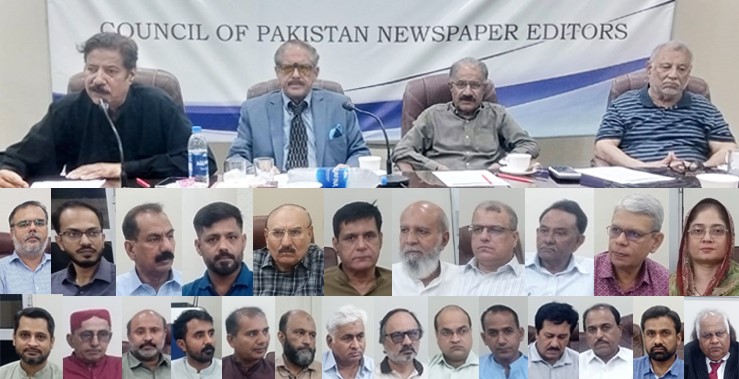Demands action for Press Freedom
Staff Report
KARACHI: The first meeting of the Sindh Committee of the Council of Pakistan Newspaper Editors (CPNE) convened to express deep concern over the overall state of press freedom in Sindh. The gathering condemned in untoward incident that took place at the Karachi bureau office of Daily Ibrat.
The meeting was chaired by Sindh Committee Chairman Qazi Asad Abid, who reaffirmed that the protection of press freedom has been the cornerstone of CPNE’s mission from day one. He noted that despite Daily Ibrat’s longstanding commitment to a moderate editorial policy for the past 68 years, it has still been subjected to an incident that remains shrouded in mystery. “What is particularly shocking,” he remarked, “is the deafening silence from government quarters — not a single official has condemned the incident, nor have relevant ministers bothered to inquire.”
Qazi Asad Abid pledged to earnestly consider all written recommendations from members and, with the consent of the CPNE President, Secretary General, and OBC, to hold monthly meetings of the Sindh Committee to ensure sustained engagement.
CPNE Secretary General Ghulam Nabi Chandio expressed confidence in the leadership of Qazi Asad Abid, stating that the Sindh Committee would play an effective role in addressing the challenges facing press freedom and member publications in the province. “We assure you,” he said, “that the CPNE Secretariat will extend full support in this pursuit.”
He added that CPNE remains steadfast in its commitment to press freedom. “The recently held grand ceremony in Islamabad for the release of the Media Freedom Report drew participation from a large number of eminent journalists,” he noted. “Not only did they attend, but they also amplified the findings through their columns and vlogs — a resounding success for CPNE.” He further revealed that CPNE is actively upgrading its website and social media platforms to enhance its advocacy for media freedom.
Aamir Mehmood, Deputy Chairman of the Sindh Committee, brought attention to the Press Council of Pakistan’s imposition of a levy on newspapers, making dues a precondition for operation. He called on CPNE to resolve this issue with strategic prudence. He also highlighted the difficulties faced by periodicals and requested CPNE’s intervention.
Dr Jabbar Khattak lamented the shrinking civic space under the hybrid system of governance, stating that “newspapers can no longer publish with courage and integrity” due to increasing pressures — including the targeting of journalists, issuance of notices to publications, and weaponisation of government advertisements.
He criticised both the Sindh and federal governments for dragging their feet on instituting a fair and transparent ad-distribution mechanism. “CPNE’s repeated demands are met with silence,” he said. “Let us not forget: advertisements are the economic lifeline of newspapers. When used as instruments of coercion, they become shackles on press freedom. And if press freedom is extinguished — so too will be the media.”
Senior member Aijazul Haq asserted that despite the dire circumstances, CPNE remains the sole organisation that consistently upholds constitutional and principled positions on press freedom, and strives to unite all media associations under a common platform. He briefed the committee on CPNE’s ongoing efforts, including recent engagements with provincial ministers to address the challenges faced by newspapers — notably a recent meeting with Sindh’s Minister of Information, Sharjeel Inam Memon.
Finance Secretary Hamid Hussain Abidi added a heartfelt reflection: “Our livelihoods are bound to journalism. Yet today, tolerance and civility have vanished from our society. If journalists are derelict in their duties, politicians too have forgotten the very essence of democracy.”
The committee resolved that any future legislation concerning media must involve consultation with relevant media stakeholders. CPNE also took strong notice of the lack of transparency on government advertising data, which is not disclosed on official websites, thereby undermining accountability.
Additionally, concerns were raised regarding the unjustified delays by Karachi’s Post Office in processing periodical payments. It was agreed that the matter would be taken up with the Postmaster General.
Attendees included:
Chairman Qazi Asad Abid, Secretary General Ghulam Nabi Chandio, Finance Secretary Hamid Hussain Abidi, Joint Secretary Munza Saham, Deputy Chairman Aamir Mahmood, and senior members including Ijazul Haq, Dr. Jabbar Khattak, Maqsood Yousufi, Sher Muhammad Khawar, Abdul Sami Mangreo, Mahmood Alam Khalid, Ali Hamza Afghan, Hassan Abbas, Mudassar Alam, Mian Fazal Elahi, Syed Mudassar, Abdul Rasool Soomro, Ayaz Memon, Saleem Sheikh, Ali Bin Younus, Muhammad Saeed Shah, Danish Channa, Shahid Sati, Waheed Memon, Nasrullah Tanio, Salman Qureshi, Qasim Soomro, Rehman Sikandar Malik, and Imran Korai.

